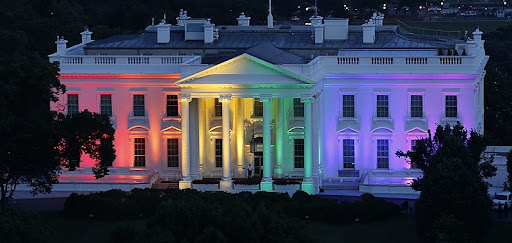Respect for Marriage Act: What does it mean?
The Respect for Marriage Act (RMA) was signed into law by President Joe Biden on Dec. 13, after passing both houses of Congress by significant margins. There was also a celebratory event on the White House lawn hosting many celebrities and advocates of the LGBTQ+ community.
This bipartisan law repeals the Defense of Marriage Act (DOMA), to ensure that all marriages are federally respected. It does not, however, codify gay marriage–-which would be where Congress or the state legislature make the Supreme Court decision, Obergefell v. Hodges, into law so no individual state could inhibit the right to marriage.
If and, likely, when Obergefell v. Hodges and Loving v. Virginia become overturned by the Supreme Court, RMA does not maintain that gay or interracial marriages must be issued in each state, but it will maintain the requirement that each state must recognize and respect all marriages that occur in other states, even if they themselves ban it within their state.
The result will be similar to how abortion is currently handled; states will ban it, and then people will have to travel to other states to get it. Heterosexual and intraracial couples are not subject to the same restrictions.
“It is a stop-gap measure,” said social studies teacher Paolo Espiritu; “it is the best we can do for the moment; Republicans agreed to support [it] because they are losing the social battle. I am happy that people’s marriages can be recognized through the 50 states, but I’m sad that we are not taking the full step and making sure people can get married in all states; [this will also create] financial strain because there are so many more barriers.”
Espiritu named it a “bill of privilege.”
Another amendment of this law is one encouraged by the Church of Latter Day Saints (LDS) to affirm their beliefs about marriage: “The doctrine of the Church of Jesus Christ of Latter Day Saints related to marriage between a man and a woman is well known and will remain unchanged.” There is a segment in the law stating that, “Congress affirms that such people and their diverse beliefs [regarding marriage] are due proper respect” and that “any refusal under this subsection to provide such services, accommodations, advantages, facilities, goods, or privileges shall not create any civil claim or cause of action.” This amendment ensures that religious institutions are not required to perform gay, interracial, or other marriages.
Many believe this is the act that will protect all LGBTQ+ people when, in reality, it is not protecting transgender people, LGBTQ+ youth, and doesn’t guarantee Obergefell v. Hodges.
“Today was an excellent step towards progress. At the same time, my LGBTQIA+ community is still very much under attack both abroad and at home. I look forward to the next steps we will take together to ensure continued justice for the entire queer community,” expressed lesbian icon Hayley Kiyoko after the signing event.

